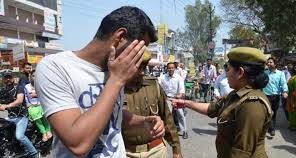The Anti-Romeo Squad in discussion on media nowadays brings to my mind memories of another time where I was involved in a program started by Delhi police on the safety of women in north-east Delhi.
As a psychologist I had been asked to give talks to girls in Government and MCD run schools about how they can prepare and protect themselves psychologically from sexual predators. The areas chosen were some of the worst areas in terms of safety of women according to the beat constables of those areas.
The first school we went to was in the interior of north Delhi. We had to pass through narrow by lanes and a road lined with shops to reach there. As we reached the school, nearly four hundred girls sat there on the ground.
My colleague talked about the need to reclaim a woman’s personal space, her individuality and what sort of struggle women face in their daily lives.
Then I gave a talk about perpetrators of different kinds and how they operate on victims. Their keen ears listened to every word we said and they nodded though I didn’t know how much of it they could realistically follow in their daily lives.
At the end, it was the time for questions and answers.
“Sir, how do we deal with ‘Romeos’?” A girl stood up and asked me.
To my academic ears the question didn’t make any sense.
“Who is a Romeo?” I asked puzzled. A loud burst of laughter followed from the girls.
The girl who had asked the question wondered how to explain a Romeo, not sure how after challenging my knowledge if she should go ahead.
A beat constable came to her rescue. “Sir, the boys who roam around the school and tease them, they call them Romeos.”
‘Romeos’ as I learnt belonged to all age groups from 16 – 60 years who follow, stare, grope, touch young preteen and teen aged girls on their way to school. They wait on cycles, motorcycles and some just wait at different corners to follow the girls as they walk back home.
“How come you don’t complain to the police?” My colleague asked.
“If we do that, sir, our parents will take us away from school the next day.”
None of the girls had ever lodged a case and the constable said these boys know it. “Once a girl had complained and the boy had been taken to the police station and was let off after a warning and an admonition. He had thrown acid on that girl a few days later. Luckily the girl had escaped but her parents had got scared and got her married off in a hurry. She had wanted to go for higher studies to become a police officer to protect women from goons,” said one of the girls.
In school after school, in lectures after lectures, in workshops after workshops, I heard the same story. “How do we protect ourselves from Romeos?”
I learnt slowly that there is separate universe inhabited by these girls which I knew very little about and many other girls of our country about whom no one knew or cared about. It is a universe where fear stalks at every corner while commuting on the road, where these so called Romeos walk around with impunity.
The Principals of the schools, the teachers, the police, all pleaded helplessness in dealing with this menace. Weak laws, political patronage of the boys and their connections all were given as excuses for the inability to do anything.
Feeling helpless and hypocritical we had almost decided to stop at one point. It was the feedback from the girls of the schools that kept us going. In feedback sheets they wrote about how they could get some space to talk about an issue no one wanted to listen to, not their parents, not their teachers and sadly not even the police. The program started by Delhi police was giving them a forum to talk and be heard. The feedback apart from writing about their fears, they also wrote about another facet to their personality, to do with their hopes, their dreams and their aspirations for their future which wouldn’t happen because of the terror they faced everyday.
We had addressed nearly a hundred schools when one Principal asked us if we would go to a school in Uttar Pradesh where the Principal was her friend and this problem was widespread.
It was not any different from the schools in Delhi we had addressed. The situation in Uttar Pradesh seemed to be much worse than in Delhi. The Romeos there often carried knives, fire arms and if confronted always said they knew the police station in charge.
As I was to surmise, going to school, to college, for millions of girls in our country is nothing short of a nightmare, a hellish experience, one that is unacknowledged by the criminal justice system, the national media and the politicians for three obvious reasons. One because they don’t complain as they are scared of being threatened and it doesn’t show as statistics. Second they are poor. And last because they don’t belong to any minority or are not a vote bank.
I would have ended it here but for short incident. I was counseling the inmates in Delhi’s Tihar jail when one day the ‘ward munshi’ of the ward for rape accused brought me a young man saying, “Sir, is chikne se baat karo (Sir, talk to this one). He knows a lot.”
After the munshi had left I asked him if he gives his consent knowing I am a psychologist and have no connection to jail or police and will not affect his case.
He said he is called ‘chikna’ by other inmates though his real name is something else. Chikna was around twenty and hailed from western Uttar Pradesh and said it was just coincidence that he was caught in Delhi for some crime he hadn’t committed there. It was a familiar story but I didn’t challenge him. He was in a mood to talk and such a meeting could reveal a wealth of knowledge for a psychologist like me. ‘Chikna’ I saw was unusually handsome with dark big eyes and had an athletic body with a slightly feminine look.
When I commented saying he must be very attractive to girls and if they are drawn towards him, he seemed to regain the feet under his ground, and told me his ways of becoming friends with girls were unique.
He said he befriends girls after noticing those ones who are pretty, look troubled, and most often walk alone. He approaches them, sympathizes with them and then induces them to run away with him for marriage.
Chikna knew more about adolescent female psychology than I did. “These girls face hell, sir, at home with all the strictness of their parents but watch movies where a hero comes and saves a woman from her loneliness. These girls long for attention and whoever gives it to them, they will follow him like a pet dog. Once you gain their trust and it is so easy, they are yours.”
“So, how many girlfriends do you have?”
He smiled shyly and said, “Sir, I will marry a virtuous girl who is not like the ones who run away but someone chosen by my parents.”
“So, what happens to your girlfriends,” I asked.
“They don’t want to go back home knowing their parents won’t accept them.”
“So, where do they go then?”
“They choose to stay behind in the city, sir, doing all kinds of things.” The sinister smile on his face was indicative of what happens to these girls.
“You just desert them, is it, after a few months?” I asked.
He nodded.
“You have never been caught?” I asked.
“No, sir. The family is too eager to bury the case for the sake of their honor. They have other daughters too whose marriage they have to think about. Many families feel shame if their girls run away. They have to pay the police and bury the case.”
Would this recent drive by the government in Uttar Pradesh work? It can if handled with sensitivity and with a professional attitude. The whole issue is an epidemic and a radical approach is necessary no doubt. A political will to address this issue is needed and it needs to be sustained over a long period. It is important to not only to create fear for those who break the law but to let them know that society will not tolerate it. The so called Romeos are large in numbers, cunning and often mask themselves. They hide, go underground and emerge in different ways and have operated for many years with impunity. One time shaming will not work as their activity of stalking is the only one thing that gives them a high. Neither will moral teaching go very far. They infact find it exciting and not at all shameful. Only a certainty of punishment that is well defined and predictable according to law, will go a long way in changing the way the girls in our society feel safe when they walk back and forth to school.

